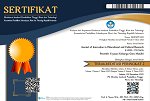Bloom's Taxonomy Theory in the Pedagogical Value of Domyak Art: An Ethnopedagogical Perspective
(1) Universitas Buana Perjuangan Karawang, Indonesia
(2) Institut Seni Budaya Indonesia Bandung, Indonesia
(3) Institut Seni Budaya Indonesia Bandung, Indonesia
(4) Universitas Buana Perjuangan Karawang, Indonesia
(5) Universitas Buana Perjuangan Karawang, Indonesia
Abstract
Keywords
Full Text:
PDFReferences
Abdurrahman, Ariyani, F., Nurulsari, N., Maulina, H., & Sukamto, I. (2020). The prospective ethnopedagogy-integrated STEM learning approach: Science teacher perceptions and experiences. Journal of Physics: Conference Series, 1572(1). https://doi.org/10.1088/1742-6596/1572/1/012082
Ainash, A., Yelena, B., Nazgul, K., Albina, A., & Galina, D. (2022). Formation of ethno-pedagogical competence of the future teacher in the aspect of modernization of public consciousness. Cypriot Journal of Educational Sciences, 17(9), 2978–2989. https://doi.org/10.18844/cjes.v17i9.8030
Alwasilah. (2009). Etnopedagogi. Kiblat Buku Utama.
Bloom, B. S. (1956). Taxonomy of Educational Objectives: Handbook 1, Cognitive Domain. David McKay.
Cahyana, U., Rahmawati, Y., Paristiowati, M., Sasmoko, Ahman, Ferdianto, J., & Dudung, A. (2020). Ethnopedagogy integration to mobile learning for improving student learning achievement in remote areas. Universal Journal of Educational Research, 8(5), 1687–1697.
Creswell, J. W., Hanson, W. E., Clark Plano, V. L., & Morales, A. (2007). Qualitative Research Designs: Selection and Implementation. The Counseling Psychologist, 35(2), 236–264.
Creswell, J. W., & Miller, D. L. (2000). Determining validity in qualitative inquiry. Theory into Practice, 39(3), 124–130. https://doi.org/10.1207/s15430421tip3903_2
Creswell, J. W. (2009). Research Design: Qualitative, Quantitative, and Mixed Methods Approaches. In Sage Publications (3rd edition, Vol. 3). SAGE Publications. https://doi.org/10.2307/1523157
De Brito, H. M. S., & Vieira, M. H. G. L. (2014). Seaweed gatherers and a string orchestra: Contributions for a musical ethnopedagogy | Sargaceiros de apúlia e orquestra de cordas: Contributos para uma etnopedagogia musical. Musica Hodie, 14(2), 99–110.
Fahrutdinova, G. Z. (2016). Ethno-pedagogical factor of polycultural training. International Journal of Environmental and Science Education, 11(6), 1185–1193. https://doi.org/10.12973/ijese.2016.388a
Heriyawati, Y. (2016). Seni Pertunjukan dan Ritual. Ombak.
Herlambang, Y. T. (2018). Pedagogik: Telaah Kritis Ilmu Pendidikan Dalam Multiperspektif. Bumi Aksara.
Khusainov, Z. A., Shigapova, N. V., Samigullina, G. S., Beketova, S. I., & Kutepova, L. M. (2016). Education of ecological culture of school children on the basis of ethnopedagogy. International Business Management, 10(23), 5612–5615. https://doi.org/10.3923/ibm.2016.5612.5615
Koentjaraningrat. (1989). Kebudayaan, Mentalitas, dan Pembangunan. Gramedia Pustaka Utama.
Krezhevskikh, O. V., & Karataeva, N. A. (2022). Experience in the application of ethnopedagogics in the subjects of the Russian Federation | Опыт применения этнопедагогики в субъектах Российской Федерации. Perspektivy Nauki i Obrazovania, 55(1), 77–94. https://doi.org/10.32744/pse.2022.1.5
Neustroev, N., Neustroeva, A., & Shergina, T. (2018). Individualization and ethnopedagogy at small elementary schools components of vocational training for University Tutors. Sibirica, 17(3), 92–115. https://doi.org/10.3167/sib.2018.170309
Nikmawati, E. E., Widiaty, I., Achdiani, Y., Hurriyati, R., & Mubaroq, S. R. (2019). Educational digital media for traditional food of Kampung adat Cireundeu: An ethnopedagogy perspective. Journal of Engineering Science and Technology, 14(5), 2540–2551.
Pheeney, C., Setiadi, E. M., Supriatna, M., & Kartadinata, S. (2015). Harnessing social media to ethno-pedagogy. ACM International Conference Proceeding Series, 07-Decembe, 5–9. https://doi.org/10.1145/2846439.2846445
Prawiyogi, A. G., Dwimarwati, R., & Afryanto, S. (2022). Nilai Pedagosis dalam Ritual Domyak. Pantun: Jurnal Ilmiah Seni Budaya, 7(1), 1–11.
Putri, N. D., & Suherman, M. (2018). Komunikasi Ritual pada Upacara Domyak. Prosiding Hubungan Masyarakat.
Rahmawati, Y., Ridwan, A., Baeti, H. R., Virginanti, M., & Faustine, S. (2021). Improving students chemical literacy and cultural awareness through ethnopedagogy in chemistry education. AIP Conference Proceedings, 2331. https://doi.org/10.1063/5.0041918
Rahmawati, Y., Ridwan, A., Mardiah, A., Sandryani, W., Mawarni, P. C., & Setiawan, A. (2019). Student engagement in science learning through the integration of ethnopedagogy in wastewater treatment project. Journal of Physics: Conference Series, 1402(5). https://doi.org/10.1088/1742-6596/1402/5/055052
Ruas, J. J. (2020). Other Knowledge, Other Practices: Logics and Popular Musical Epistemologies in Countryside Education | Outros Saberes, Outros Fazeres: Lógicas e Epistemologias Musicais Populares em Educação do Campo. Musica Hodie, 20. https://doi.org/10.5216/MH.V20.59806
Sumardjo, J. (2010). Estetika Paradoks. Sunan Ambu Press.
Supriatna, M. (2020). Pendidikan Berbasis Kearifan Etnik. Akademia Pustaka.
Supriatna, N. (2015). Local Wisdom In Constructing Students’ Ecoliteracy Through Ethnopedagogy And Ecopedagogy. 1st UPI International Conference on Sociology Education, 126–133. https://doi.org/10.2991/icse-15.2016.28
Supriyadi., Waremra, R. S., & Betaubun, P. (2019). Papua contextual science curriculum contains with indigenous science (Ethnopedagogy study at Malind Tribe Merauke). International Journal of Civil Engineering and Technology, 10(2), 1994–2000.
Toleubekova, R. K., Zhumataeva, E., & Sarzhanova, G. B. (2022). The Role of Ethnopedagogy in Shaping Positive Attitudes towards Traditional Values of Kazakh People among Future Teachers in Kazakhstan. Koers, 87(1). https://doi.org/10.19108/KOERS.87.1.2430
Toleubekova, R., & Zhumataeva, E. (2018). The role of ethnopedagogy in shaping positive attitudes towards traditional values of Kazakh people among master’s students majoring in education in Kazakhstan. Problems of Education in the 21st Century, 76(6), 834–846.
Wheeldon, J., & Ahlberg, M. (2019). Mind maps in qualitative research. In Handbook of Research Methods in Health Social Sciences. https://doi.org/10.1007/978-981-10-5251-4_7
Zhuzeyev, S., Zhailauova, M., Abuova, A., Koishibaev, M., Aidarov, O., & Maigeldiyeva, Z. (2022). Professional training of future primary school teachers based on ethnopsychological features and ethnopedagogical traditions. Cypriot Journal of Educational Sciences, 17(9), 3067–3077. https://doi.org/10.18844/cjes.v17i9.8034.
Refbacks
- There are currently no refbacks.
View My Stats

